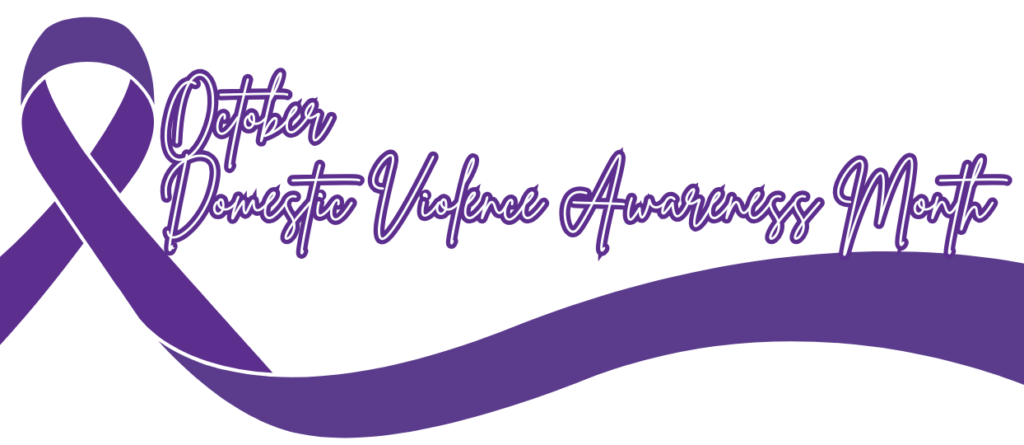SeniorLAW Center Recognizes October as Domestic Violence Awareness Month
In 1989, the United States Congress declared October as Domestic Violence Awareness Month. Every year since then, SeniorLAW Center has proudly joined victim service agencies and organizations across the country to recognize and raise awareness of the needs, voices, and experiences of survivors.
According to the National Domestic Violence Hotline, an average of 24 people per minute are victims of rape, physical violence or stalking by an intimate partner in the United States — more than 12 million women and men over the course of a single year. Nearly 3 in 10 women (29%) and 1 in 10 men (10%) in the US have experienced rape, physical violence, and/or stalking by a partner and reported it having a related impact on their functioning.
Statistics on abuse of older adults remain underreported and an historical focus on other groups of survivors has eclipsed the staggering prevalence with which it occurs. Not all elder abuse qualifies as domestic violence. Nevertheless, the National Council on Aging and the United States Department of Justice estimate that anywhere between 60% and 90% of elder abuse perpetrators come from the victims’ families or households. Other studies estimate that 90% of elder abuse cases occur in the victim’s home. [1]
Some shocking facts:
- In the past 20 years, the rate of nonfatal assaults involving seniors has risen over 75 percent for men and over 35 percent for women.
- Nearly 5% of all seniors suffer psychological abuse in any given year.
- Rates of elder abuse increased dramatically during the COVID-19 pandemic.
- Older Americans lose nearly $36.5 billion every year because of financial abuse. [2]
The World Health Organizations defines elder abuse as “a single or repeated act, or lack of appropriate action, occurring within any relationship where there is an expectation of trust, which causes harm or distress to an older person.” Elder abuse takes many forms: physical, sexual, psychological, emotional abuse and financial.
As part of Domestic Violence Awareness Month, SeniorLAW Center would like to highlight the particular challenges and barriers to justice that older survivors face. Please read our latest blog post for some key Q&As and facts about domestic violence against older adults.
Pennsylvania law offers some protection for survivors of domestic abuse. Read on to learn more.
Protection from Abuse
Older Pennsylvanians experiencing domestic violence may want to file a petition for protection from abuse. Under Pennsylvania’s Protection from Abuse Act, a court may impose a temporary or final order of protection against an abuser for a period of up to three years. Depending on the specific circumstances of the abuse, the order may also remove abusers from the survivor’s home and, in some cases, require them to make ongoing rent or mortgage payments despite their eviction.
Each of the Commonwealth’s sixty-seven counties have slightly different procedures for filing a petition for protection from abuse. If you are or someone you know is a Pennsylvania resident, sixty years of age or older and requires help with this process contact us at 1-877-PA-SR-LAW (1-877-727-7529).
Who can file a petition for protection from abuse?
Anyone eighteen years or older may file a petition for protection from abuse in all cases where the abuser is an intimate partner, current or former spouse, or a relative either by blood or marriage.
Where do you file a petition for protection from abuse?
You must file a petition in person in the Court of Common Pleas in the county where you live.
In Philadelphia, you may file a petition in the Domestic Violence Intake Unit at Family Court at 1501 Arch Street, 8th Floor, Philadelphia. There is no fee. The Unit will help you prepare and file your petition if you do not have a lawyer. Language interpretation services are available at the filing unit and at the hearing. The Unit is open from 8a.m. to 3 p.m. However, you should arrive by 8 a.m. and be prepared to wait your turn. If you arrive after 12 p.m. there may not be time to get your petition prepared and filed that day. Information is available by telephone 24 hours a day at 215-686-3512.
If you live in Philadelphia and need to file a petition after 5:00 p.m. or on a weekend or holiday, weekends, you may do so at the Criminal Justice Center, Room B-03 at 1301 Filbert Street, Philadelphia, PA (215-683-7280).
What can an order of protection from abuse do?
An order of protection from abuse can do a number of things to help keep you safe. For example, an order can require the abuser to:
- Stop abusing, stalking, threatening, and harassing you.
- Not to have any contact with you.
- Stay away from your home, even if the abuser lives there as well.
- Turn weapons over to the police or sheriff or other person authorized by law to accept them.
An order can also include:
- Temporary child custody
- Temporary child support
- Payments to the victim for reasonable losses
- Plaintiff’s counsel fees
What happens if the abuser does not obey the order of protection from abuse?
Although protection from abuse cases are civil matters, if an abuser fails to obey the terms and conditions of the order, they may be charged with indirect criminal contempt. This means that they will have to appear in criminal court to defend themselves against the contempt charges. If found guilty they may face up to six months in jail and up to $1,000.00 in fines, or up to six months of supervised probation and up to $1,000.00 in fines, and, in some cases, a criminal conviction. Additionally, a finding of contempt may result in the extension or modification of the existing order.
[1] https://verdictvictory.com/blog/elder-abuse-statistics
[2] Id.


